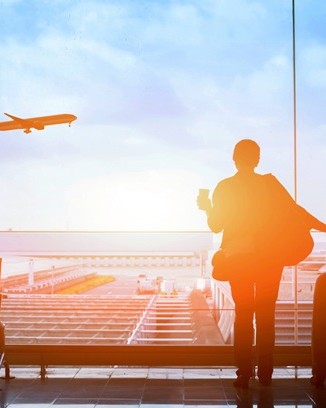Understanding this condition, which can occur on both short and long flights, can make your trip much more comfortable. Let's explore the scientific reasons behind ear pressure and the practical solutions you can apply to alleviate this problem.
What Causes Ear Pressure on an Airplane?
As airplanes take off and descend, there are significant changes in cabin pressure. These changes create a difference between the outside atmospheric pressure and the pressure inside the airplane. We feel this difference in our ears because our eardrums are sensitive to the outside pressure. Normally, the pressure inside our bodies matches the pressure outside, but when the airplane ascends or descends rapidly, this balance is disrupted.Cabin pressure decreases as the plane climbs, which causes the air space in our ears to try to adjust to the lower pressure coming from outside, creating a feeling of pressure in the eardrum. As the plane descends, the external pressure increases and presses on our ears. If the pressure difference in the eardrum is not sufficiently balanced, this can cause discomfort, congestion or even pain in the ears.
Who Is More Affected?
Some people may experience more discomfort due to ear pressure during a flight. Here are some of these situations:- Children : Young children may be more affected because their ability to balance pressure differences in their ears is not developed yet. They may also have a harder time tolerating pressure changes because the tube system in their ears is narrower.
- Those with Colds or Sinus Problems : Health problems such as the flu, colds or sinus infections can cause ear congestion. This can cause ear pressure to become more uncomfortable on an airplane.
- Allergies : Allergies can cause nasal congestion and prevent the eardrum from working properly, which can increase the feeling of pressure in the ears during flight.
- Additionally : Individuals with existing eardrum problems (for example, ear infections or ears with tubes) may also experience increased discomfort during the flight.
Ear Pressure Symptoms
Changes in ear pressure during air travel, diving, or high altitude environments can cause uncomfortable symptoms. Here are some of the symptoms of ear pressure:- Ear Congestion and Feeling of Fullness
- Mild or Severe Earache
- Hearing Loss or Humming
- Dizziness and Feeling of Imbalance
What Can Be Done to Prevent Ear Pressure Before Flight?
To prevent discomfort caused by ear pressure during a flight, you can take some simple precautions. Here are some tips to help balance ear pressure before your flight:Drinking Plenty of Water and Using Nasal Sprays
Drinking plenty of water before your flight will help to hydrate your body and help you tolerate pressure changes in your eardrum more easily. Nasal spray or saline irrigation can also help open up your sinuses and make your ears less sensitive to pressure changes.Precautions to be taken in case of cold or sinusitis
If you have a health condition such as a cold, flu or sinusitis, be sure to consult a doctor before flying. These conditions can make your ears more sensitive to pressure. Your doctor may recommend medications or methods to help relieve your ears during the flight. Using decongestants before flying can help reduce nasal and ear congestion.Use of Pressure-Balancing Earplugs and Earplugs
Pressure-equalizing earplugs transmit the pressure changes inside the plane to your ears in a slower and more controlled manner. These plugs can help balance the difference between the cabin pressure and your inner ear, preventing your ears from hurting. You can also use earplugs, but earplugs are more effective at equalizing the pressure.Effective Ways to Reduce Ear Pressure During Flight
There are various methods that can be applied to reduce pressure changes in the ears during the flight and have a comfortable journey. Here are some effective techniques that can help balance ear pressure:Chewing Gum, Swallowing and Yawning
As cabin pressure changes during takeoff and landing, you may feel increased pressure in your ears. Chewing gum, swallowing, and yawning help your ears adjust to the pressure changes by opening the Eustachian tube. These actions help equalize the pressure on both sides of the eardrum and may eliminate the feeling of ear congestion.Nasal Sprays and Natural Remedies
If you have nasal congestion, using nasal decongestants before or during your flight can help open your airways and ease the pressure differences in your ears. Natural methods include rinsing your nose with salt water or applying a warm compress to help relieve your sinuses and balance the pressure in your ears. Taking deep breaths and exhaling slowly can also help relax your body and balance your ears.Ear Pressure Reduction Methods for Babies and Children
Babies and children may be more affected by ear pressure changes during flights. It can sometimes be difficult for them to balance the pressure differences in their ears, but it is possible to relieve it with some methods. Here are effective solutions to reduce ear pressure for babies and children:Pacifier or Bottle Use
One of the most effective methods for babies is to suck on a pacifier or use a bottle. A pacifier encourages babies to swallow, which helps balance the pressure differences in their ears. Similarly, giving your child water from a bottle can help them swallow and reduce the pressure in their ears.What can be done to prevent ear congestion in children?
One reason why children are more prone to ear congestion is often nasal congestion. In this case, rinsing the nose with nasal spray or saline before the flight can help prevent changes in ear pressure. It is also important to ensure that children drink water frequently during the flight or encourage them to chew gum to help balance ear pressure.Advice for Parents Before and During the Trip
- Pre-travel preparation : Before the flight, if your child has nasal congestion, clear their nose with nasal sprays. Also, if the child is going to sleep, try to ease the effects of pressure changes by doing some operations while they are awake.
- Be Patient During the Journey : Children's ears can get really stuffy and uncomfortable during the flight. Keeping your child calm and giving him a pacifier or bottle to comfort him can be a good solution.
- Fun Techniques : If your child is old enough, you can play games to encourage swallowing. Activities such as singing songs or saying “aah” can also help to equalize ear pressure.







